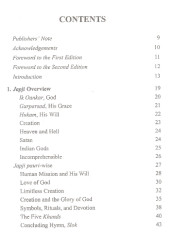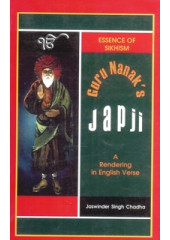Monday to Saturday - 10:00 Am to 9 PM
Now Enjoy Bulk Discounts on Books as Mentioned Below
These Discounts are in addition to the Discounts on Individual Books (Visible as Bulk Discount for Books in Cart)
Extra 10% Off If Books Purchased Exceeds Rs 3000 or 75 USD or 60 GBP or 60 Euro or 100 AUD or 100 CAD
Extra 15% Off If Books Purchased Exceeds Rs 6000 or 150 USD or 120 GBP or 120 Euro or 200 AUD or 200 CAD
Extra 20% Off If Books Purchased Exceeds Rs 15000 or 225 USD or 180 GBP or 180 Euro or 300 AUD or 300 CAD
Extra 25% Off If Books Purchased Exceeds Rs 30000 or 300 USD or 240 GBP or 240 Euro or 400 AUD or 400 CAD
1. Japji, the preamble to Guru Granth Sahib, the Sikh scripture, reveals the mission of human life. It defines the goal as the realization (understanding) of God, the Almighty Lord, Ik Oankar, and describes the ways to achieve that. The hymns also caution us about the pitfalls in the path to that goal and the methods of avoiding them or overcoming them. The message of Japji can be understood properly only against the background of the religions that were practised when Guru Nanak appeared on the scene. About half a dozen of them are today called higher religions or major religions.
2. Human beings have always desired to live a long, happy and meaningful life. For this, the first thing they needed was food and physical comfort. This, of course, depended upon weather, which is controlled by sun, rain, winds, etc. First human beings, therefore, started the worship of the weather elements as gods. In due course of time, people realized that they are not just other animals; they have been provided with unique faculties and they command a special status on the earth. Therefore, their life is not just to be lived as animals live, ie, eat, grow, produce children, get old, complete the biological cycle and die. They must have a higher purpose of life. This thought led to the revelation that they, as human beings, have a spiritual goal to achieve in their lives. Religions were thus born.
According to a simple definition of a religion, it may be defined as a package of what is needed for leading a virtuous life, that assures everlasting happiness to one's soul here and in the next world (after death). This package, a set of beliefs, instructing do's and don'ts, of course, is different for different faiths. Many of them, in one form or the other, believe that Almightly God created this universe. He has reserved Heaven for the faithful people and those who lead a virtuous life. These who ignore him and His directions (called faith) will end in Hell. Some religions, however, do not involve God. They preach a life of restraint and meditation for freedom from pains and sorrows. Their goal also is to live in everlasting peace here and hereafter.
Religion is supposed to preach that all people, being the creation of the same Father-Mother, should have mutual love as brothers and sisters. It should unite people belonging to different nations, races and ethnic groups into one big family called humans. However, religions instead of decreasing have increased our ego, which has divided us into mutually hating groups. The message of Japji is that submitting oneself to His will can destroy our ego and permit the growth of love for humanity in the mind. It therefore, helps people to move on the path of peace and realize the mission of human life.
3. Japji was composed by Guru Nanak Dev (1469-1539) during the last phase of his life when he settled at Kartarpur, Punjab, Pakistan. Earlier, he had the revelation of the divine message that all the people are equal, whatever their race, country, caste, or creed. No one can claim a franchise on the Creator, the Director of this universe; anyone who loves Him (by any name) realizes Him. After this the Guru toured for about two decades to meet religious preachers of different faiths and share this revelation with them. He visited important holy places in India and abroad, including Mecca and Medina in the West, Ceylon (Sri Lanka) in the South, and Tibet in the Himalayas.
The message of the Guru he shared with the masses is very simple and easy to understand. To explain it, he founded the institutions of sangat and pangat. Sangat is a congregation where all people, irrespective of their faith, caste, creed, status, etc., get together as equals to sing the praises of God, the Father-Mother of all humanity. In the Sikh scripture, Guru Granth Sahib, we find the hymns of the Muslim, Hindu and 'low caste' devotees. By loving Him in their own way, they all realized God, which vibrates in every human being. The congregation, when people jointly prepare food and partake of it together as equals, is named Pangat.
A religious revolution was thus founded. Mutually hating Muslims and Hindus, high caste and low caste, rich and poor, men and women, all together formed one brotherhood who would pray together and eat together as equals. They became popular as 'leaners of the truth', the sikhs (the word was later capitalized as Sikhs to identify the members of the faith). They were told to love the Lord by any or all names including Allah, Ram, Hari, Guru, Gobind, etc.
The mission of Guru Nanak was to unite the split-humanity into one brotherhood having mutual respect for each individual. The true religion according to him is to sacrifice personal interest for the common good of society and not the other way around to sacrifice others' interests for selfish gains. He preached that the path of everlasting real peace and happiness is to love the lowly and help the needy. It is not merely the knowledge of this truth but its practice in daily life that makes a person holy. A hymn (Vidya Veechari Tan Parupkari) tells that a 'learned person' is one who is motivated with a desire to help the needy.
4. More than one hundred translations of Japji have been published by different scholars in English, Punjabi, Urdu, and Hindi. They are verse-by-verse translations and the youth do not get a composite message of the whole can to remember as a guide in their thinking and their lives. A few efforts have also been made both in English and in Punjabi to give the overall meaning of a pauri or a group of pauris. However, western youth find those translations loaded with divine words, many of which are jargon to them.
This is a joint effort by the members of the Canadian Sikh Study and Teaching Society, Vancouver BC, Canada. Their personal experience of the message obtained by reading Japji (and, of course, other Gurbani) over a long period, studying translations written by different authors, and listening to the discourses of different Gianis/scholars, has formed the basis of this translation.
Punjabi and its dialects are the main language of Gurbani. It includes lots of words from Hindi and old Indian languages. Words from other languages Arabic, Persian etc., of the regions visited by Guru Nanak are also there. Even the Punjabi language in vogue, when Guru Nanak composed these hymns, has changed a lot during the last 500 years. Hence the difficulty of the scholars to agree on only one meaning of a hymn.
Because of the great sublety and spiritual depth involved, every hymn may no interpreted to suggest more than one correct message but no interpretation may be completely correct. It is very difficult, impossible in some cases, to state the full spiritual message of a hymn in limited easiy understandable words. While preparing this book, the aim always was to express the spirit of the message of the hymn and to maintain the continuity of the passage.
The objective of this translation, if this can be considered a translation, is to present the message of Japji in an easily understandable form, particularly to the western-educated youth. This book will be of great help to understand the verse-by-verse detailed translations already published by many authors.
The reader may study this book considering it to be a philosophical treatise rather than a traditional translating of Japji. An overview has also been witten to meet the desire of the readers to know specifically about God and creation. Scholars will also find here the mention of the purpose of life and how to face daily situations in the present day world.
In quite a few cases, it was not possible to choose the proper words to convey the message correctly. In such cases a consensus was reached on the 'best fit' words. The intention is not to publish a better or more authentic translation of Japji than those already available but to state its main message so that it can be easily conceptualized by common persons. It may not be fully correct when a certain word is translated into western terminology because of different connotation. The Society, therefore, welcomes the critical comments from the readers/scholars to make this translation as true to the original message as possible.
Table Of Contents For 'The Message of Gurbani' Book By Dr Gurbaksh Singh
|
CONTENTS |
Page No | |
| Publishers' Note | 9 | |
| Acknowledgements | 10 | |
| Foreword to the First Edition | 11 | |
| Foreword to the Second Edition | 12 | |
| Introduction | 13 | |
| 1. |
Japji Overview |
19 |
| Ik Onkar, God | 20 | |
| Gurparsad, His Grace | 21 | |
| Hukam, His Will | 22 | |
| Creation | 23 | |
| Heaven and Hell | 24 | |
| Satan | 24 | |
| Indian Gods | 25 | |
| Incomprehensible | 26 | |
| Japji pauri-wise | 27 | |
| Human Mission and His Will | 28 | |
| Love of God | 30 | |
| Limitless Creation | 32 | |
| Creation and the Glory of God | 35 | |
| Symbols, Rituals, and Devotion | 38 | |
| The Five Khands | 40 | |
| Concluding Hymn, Slok | 43 | |
| 2. |
Rehras |
44 |
| First set : So-Dar | 44 | |
| Second Set : So Purkh | 48 | |
| 3. |
Sohila |
52 |
| 4. |
Anand |
57 |
| Pauri-wise message | 58 | |
| Conclusion | 69 | |
| 5. |
Asa Ki Var |
70 |
| The Message of the Var | 71 | |
| Pauri-wise Meanings | 73 | |
| 6. |
Who is god ? |
104 |
| Revelation | 105 | |
| Misunderstanding God | 106 | |
| Discovering God, Father-Mother of Whole Humanity | 107 | |
| God Realized | 109 | |
| God Described | 111 |
| Books | |
| Author | Dr Gurbaksh Singh |
| Pages | 118 |
| Cover | Hardbound |
| Language | English |
The Message of Gurbani - Book By Gurbaksh Singh
- Brand: Singh Brothers
- Product Code: SPE115
- Availability: In Stock
-
Rs.60.00
Related Products
The Essence of Japji - Book By Shamsher Singh Puri
Summary of 'The Essence of Japji' By Shamsher Singh Puri The original Punjabi text of the Japji i..
Rs.120.00
Bandginama (English ) - Book By Raghbir Singh Bir
Foreward To The Book 'Bandgi Nama' By Raghbir Singh Bir In spite of the affluence, the material c..
Rs.250.00
Prabhu Simran - Book By Giani Sant Singh Ji Maskeen
Preface Of The Book 'Prabhu Simran' By Giani Sant Singh Ji Maskeen In the world every body and ev..
Rs.125.00
Guru Nanak Japji - A Rendering In English Verse - Book By Jaswinder Singh Chadha
Summary of 'Guru Nanak Japji , A Rendering In English Verse' By Jaswinder Singh Chadha At o..
Rs.100.00
Tags: books concepts of sikhism, books on gurbani essence, books on gurmat philosophy, books on message of gurbani, books on rehat maryada, books on sikh attributes, books on sikh faith, books on sikh identity, books on sikh ideology, books on sikh philosophy, books on sikh qualities, books on understanding gurbani the, gurbaksh, singh, english









